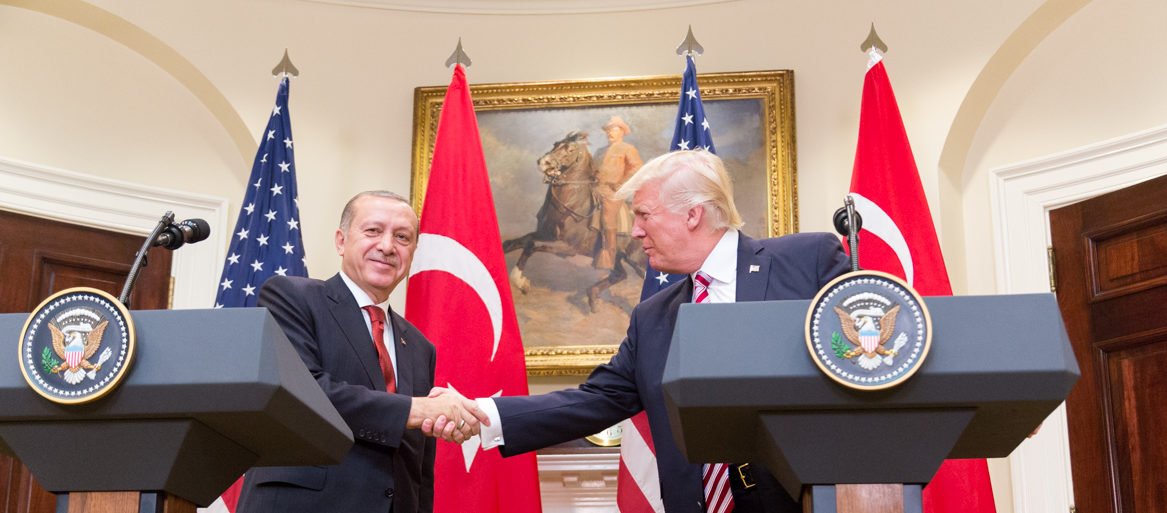A nation must think before it acts.
After three days of talks in Turkey, representatives from Washington and Ankara failed to reach agreement on the terms of a proposed safe zone in northeastern Syria. The two sides, treaty allies since 1952, share such widely divergent interests in Syria that compromise appears exceedingly difficult, if not impossible. The reasons for these divergent interests are often described as an outcome of a half-hearted American intervention in Syria, where a small and limited military operation to oust the Islamic State resulted in a military partnership with the Kurdistan Workers’ Party (PKK) affiliate in Syria, the Peoples’ Protection Units (YPG). The YPG is the core component of the U.S.-supported Syrian Democratic Forces (SDF), the militia that Washington depends on to hold the territory taken from Islamic State. This is only half the story and does not capture the nuance of the slow and painful deterioration of Turkish-American relations.
The United States has sought to ameliorate Turkish security concerns through a proposal that establishes joint-combat patrols and pledges to ensure that the YPG does not threaten Turkey from territory inside Syria. Ankara, in contrast, has pushed to control a territorially contiguous, 32 kilometer-deep zone that would be free of Kurdish elements that Ankara deems politically unsatisfactory. After four formal, high-level government-to-government meetings, the two sides are nowhere closer to overcoming this divergence.
Now, after all of these meetings, the two sides remain in the “talking phase,” which has intrinsic value on its own, but does not mean that an agreement is any closer to materializing. The refusal to make (or accept) concessions is, on both sides, a political choice. However, both capitals’ choices reflect a clear reality: Washington has decided that a hardline, anti-Iran/Assad policy is more valuable for U.S foreign goals than its relationship with the Turkish government. Ankara, in contrast, has chosen a hardline, anti-Kurdish approach as more vital to its own interests. These twin decisions reflect the desires of Presidents Trump and Erdogan—and it underscores just how fraught the relationship has become.
The root of the problem is that Washington views Sunni-majority, transnational Jihadist groups as a military problem that justifies the use of force abroad. Turkey, in contrast, views this threat as a law enforcement issue, and views the problem as limited to within its own borders. For the Kurdish issue, Ankara has committed to using force abroad, in Iraq and Syria, to deny safe haven in a policy that mimics Washington’s concerns about transnational Jihadists. The threat of a transnational Kurdish movement, for Turkey, is considered an existential struggle that could, at its extreme, split the country into two along ethnic boundary lines. The United States, quite simply, does not share this concern. Instead, Washington views Kurdish terrorism as a political irritant and as an issue that could be dealt with through political inducements and proper law enforcement.
This key divergence in threat perceptions explains why, since late 2015, the two sides have drifted so far apart on how to prosecute the war against Islamic State. Ankara viewed the terror group as an outgrowth of the Syrian civil war. Therefore, to combat ISIS effectively, the United States should have focused on eliminating the root of the problem: Bashar al-Assad’s brutal governance. Washington, in contrast, correctly viewed Ankara’s policy prescriptions as “mission creep” and part of a broader effort to enlist the United States in a military campaign to topple the Syrian regime. In the end, both the Obama and Trump administrations opted to pursue a narrow, counter-terrorism mission linked the territorial defeat of Islamic State.
However, as the U.S. succeeded in its primary goal, the mission in Syria shifted to reflect the desires of hawks in the Trump administration. Hardliners like National Security Advisor John Bolton have made the case that the physical American presence in northeast Syria can be used to strangle the Syrian regime, which alongside more sanctions on Iran, could make life so miserable for both countries that they make political concessions to Washington.
Ankara does not share this point of view. It is simply a fact that after years of working to topple Assad, Ankara has (since 2015) shifted its priorities to focus on three interrelated priorities. First, through pressure on Washington, Ankara is determined to deny safe haven to the SDF. Second, through its control of northern Aleppo and Afrin, both taken by military force, Turkey is investing resources to create a livable space for Syrian refugees to return home. Third, to ensure that Ankara has a say in how the conflict is settled, Turkey is working with Russia on convening a committee of Syrians from rival camps to draft a new Syrian constitution.
In each one of these cases, the United States is an irritant to Turkish policy planning. These terms, of course, will include hardline demands on no serious devolution of political or military concession to any Kurdish-governed entity in the northeast. Washington, in contrast, now views Syria’s northeast as leverage against the regime, and will soon try to resuscitate a rival forum to the constitutional committee talks that Ankara and Moscow are spearheading.
This is not a picture of two countries on the cusp of reaching agreement on an overarching vision for Syria. Ankara and Washington are competing in Syria to achieve different outcomes. Turkey can live with a small, token American ground presence so long as it can isolate (and then kill) the Kurdish leaders that Washington has fought alongside for 4 years. Washington is prepared to live with a small, token Turkish ground presence, so long as they do not kill the ground forces that U.S. forces depend on to hold territory taken from ISIS.
Given this reality, talks may continue, but compromise and actual negotiations may be impossible.




